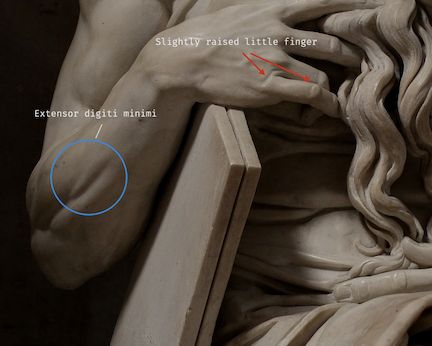Masterpieces NOT of Stone
Michelangelo's famed sculpture of Moses was created in the early 1500s. It is, like all of Michelangelo's works of art, considered a masterpiece. Unique to this particular masterpiece is the depiction of a small muscle in the forearm that contracts when lifting the pinky finger — the Extensor Digiti Minimi. This particular muscle is usually invisible, unless and until it is contracted to raise this small finger, as indeed Moses' sculpted form is doing. Such attention to detail serves the purpose of making this work of art appear perfect in its representation of the human form.
Art historians and critics the world over marvel at the “master’s” knowledge and understanding of human anatomy, giving praise and glorious laud to his skill, his artistry, and the perfection of his craft.
Yet Michelangelo, as skilled and gifted as he was, was merely copying the design of the True Artist, the Creator God, who Himself formed and fashioned the very muscle structure the sculptor was emulating. So, when all is said and done, Michelangelo’s creation was still and all just a piece of stone. Lifelike, yes — but mere stone, designed to bring honor and glory to its creator, the artist.

While Michelangelo crafted masterpieces from stone, the Lord crafts masterpieces of flesh and bone, of heart and soul. WE are his workmanship, His masterpieces, created to bring HIM glory!
“For we are his workmanship, created in Christ Jesus for good works, which God prepared beforehand, that we should walk in them” (Ephesians 2:10, ESV).
Thank Your Waitress ...
The waitress at the cafe serves you the meal she did not purchase or prepare. The cafe owner purchases the food and the cook labors over every detail of the preparation. Yet, they remain hidden, unknown and unseen. The waitress takes orders and places the food on the table and is the one who hears the words, "Thank you!"

In much the same way, pastors take prayer requests and serve you the Good News of Christ. It is appropriate to give them an occasional "thank you," but be sure to give the ultimate credit and glory to God for all that you receive in life, the tangible and the intangible, the physical and the spiritual.
"But he answered, "It is written, 'One does not live by bread alone, but by every word that comes from the mouth of God." (Matthew 4:4)
Loving Thanksgiving for What It Isn't
“Thanksgiving may be my favorite holiday,” writes journalist Rob Nikolewski.
After all, any holiday where you can watch football while the lovely ones in your life ply you with food and drink is, by definition, a great holiday in my book.
But it’s also a wonderful holiday for what it is not.
It’s not a holiday that comes with an attendant production number, such as the “Christmas season.”
It’s not a holiday of forced sentiment such as Valentine’s Day.
It’s not a holiday that has morphed into an excuse for excess and associated dopey behavior like you see on New Year’s Eve or St. Patrick’s Day.
It is not accompanied by a sense of false piety … that often comes with Easter.
It does not require the purchase of neckties like Father’s Day.
It does not include the use of fireworks, sparklers or any other explosive, flammable or incendiary material as seen on the Fourth of July.
It’s a holiday that hasn’t been ruined by adults who have co-opted it from children and used as an excuse to indulge in ludicrous dress and/or activity like Halloween.
It’s more fun than Arbor Day and less sanctimonious than Earth Day.
[Rob Nikolewski is a three-time Emmy Award-winning journalist with a master's degree in journalism from the Medill School of Journalism at Northwestern University and a master's in public administration from Columbia University.]
"Thanksgiving, instead, is a day devoid of pretension," says Nikolewski "… There is also something humble about this day. It doesn’t glorify or boast — except possibly to a higher power beyond our own capacity to take credit for. …[It is a ] blessed, unassuming day."
There is indeed something quite innately humble about the virtues of gratitude and thanksgiving. Quite possibly, as the writer suggests, because all focus is on those things, those people, and that “higher power” to whom we owe gratitude, rather than on ourselves.
“Oh give thanks to the Lord; call upon his name; make known his deeds among the peoples!” (1 Chronicles 16:8).